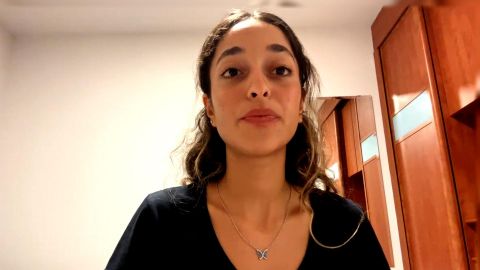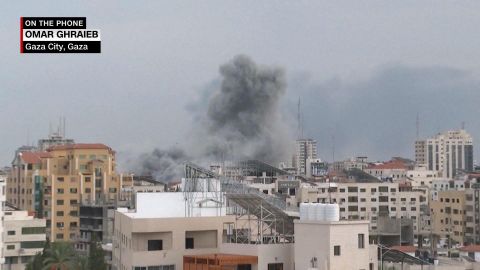Read Transcript EXPAND
CHRISTIANE AMANPOUR, INTERNATIONAL HOST: And next, we’re going to go live to Gaza to speak to the Oxfam humanitarian worker, Omar Ghraieb. He is joining us by phone. And we want to welcome you to the program. Can you first, Omar, start by telling us what you are witnessing right now. What has been happening all day today?
OMAR GHRAIEB, HUMANITARIAN WORKER, OXFAM: Yes. Thank you for having me, Christiane. A lot is happening. You are witnessing a compounded round of escalation. So, 600 Palestinians have been killed across the Gaza Strip and over 3,000 are wounded. And of course, the numbers are escalating by the minute. So, Israel also declared a full closure of Gaza, which means no entry of food, or fuel, or medicine, really compromising the entire situation even more. What we witnessed is very heavy airstrikes, hundreds of military airstrikes by Israel across the Gaza Strip, by land, air, and sea, including some of Gaza’s destroyed essential water and sanitation infrastructure. Which really raises the fear that Gaza will run out of drinkable water. And keep in mind that the drinkable water is already scarce. But we’re seeing a lot of targeting to (INAUDIBLE) building, houses, towers, and, you know, this also affecting the displacement. So, yes. It’s been a tough couple of days.
AMANPOUR: Omar, on Saturday, after this assault, Netanyahu told “residents of Gaza to get out now, because we will operate everywhere and with full force.” And you may have heard some very, very tough, you know, comments about what’s coming from our Israeli IDF spokesman and others on our program earlier. So, my question to you is, where are civilians meant to go? Where are they going? Are they getting the warnings in time?
GHRAIEB: Actually, we’re having the same questions, honestly. The Gaza Strip has no shelters, has no bunkers, and have no safe zones. So, when people hear that, I’m not sure they know exactly where to go. Considering that it really impacts our cascading across the whole of the Gaza Strip. So, I’m not sure how people will perceive this, and what to do with it. I don’t deem it as really beneficial to people, because, you know, the Gaza Strip is a small coastal (ph) in place, and it’s all compromised with (INAUDIBLE) people have, you know, no place to go besides the (INAUDIBLE). So, it doesn’t make sense to me.
AMANPOUR: Do you — are you all bracing for a ground assault? And as you’ve mentioned, I mean, basically, what the defense minister said that there is a total siege on those, you know, lifesaving food, water, fuel, electricity. Are you bracing for a ground assault? And again, have you got anything to compare that with, in your experience, in the past?
GHRAIEB: Of course, I witnessed all the past escalations or most of them, and just to talk to you from a personal perspective, it’s like bringing all the past bombardments and compounding them into one really 10 times or 100 times more intense and fiercer (ph) escalation against the Gaza Strip, which is really causing everybody, you know, to really frantically think of what might come next, and what to do to (INAUDIBLE), you know, basically.
AMANPOUR: Are you — you know, again, everybody is going to start focusing in a few days, no doubt, on the humanitarian situation. The U.N. World Food Programme called for the creation of humanitarian corridors. But that doesn’t seem likely possible at all now. Would you agree with that?
GHRAIEB: What really matter on ground is for the ground to tell you what are they needs. We’re close monitoring, of course with very dangerous actually being on ground and, you know, closely at best. So, we’re monitoring to see what’s exactly happening so we can hopefully be (INAUDIBLE) where we can immediately prepare and get humanitarian responses.
AMANPOUR: Yes.
GHRAIEB: But for now, nothing is clear, and, you know, the country (INAUDIBLE) anything.
AMANPOUR: Omar Ghraieb, we’ll keep checking in. Thank you very much, Oxfam inside Gaza City. Thank you for joining us.
About This Episode EXPAND
Alexandra Ariev’s sister has been kidnapped by Hamas. Amit Ganish survived their attack on an Israeli music festival. Both join the show to talk about their experience. IDF spokesperson Jonathan Conricus and former Israeli foreign minister Tzipi Livni discuss the situation from Tel Aviv. Efraim Halevy on the failure of Israeli intelligence. Omar Ghraieb & Jan Egeland on the situation in Gaza.
LEARN MORE

